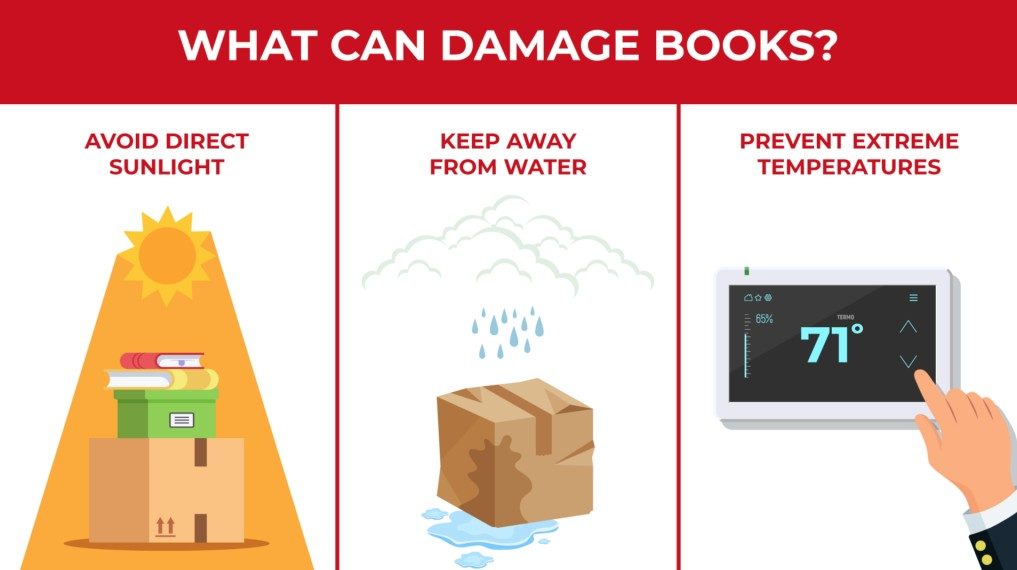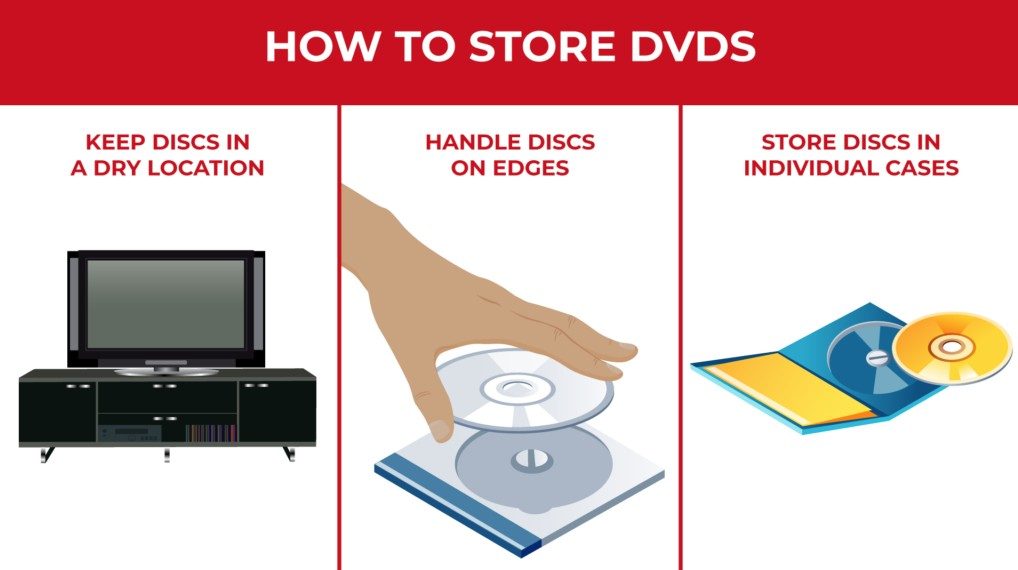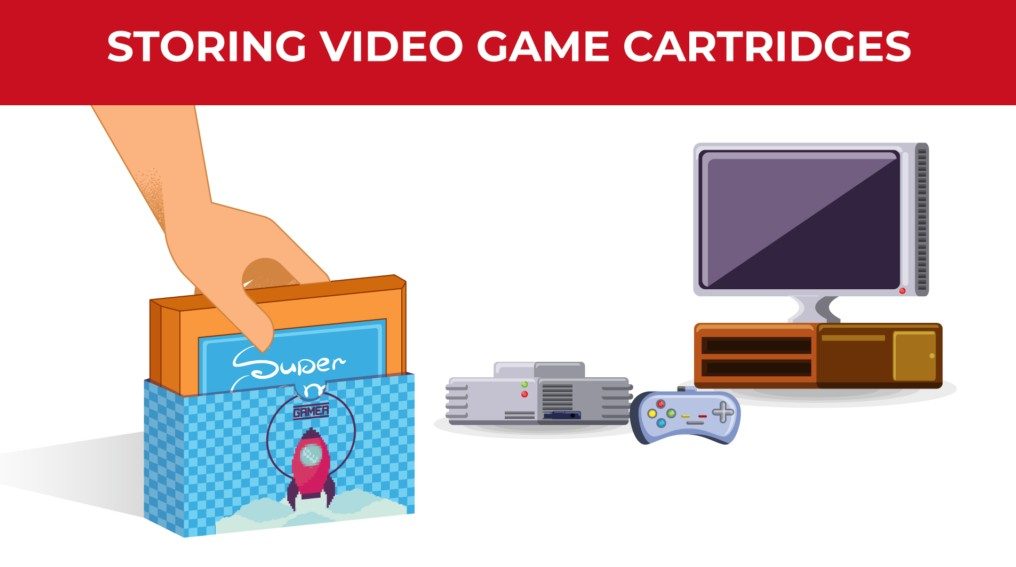We live in a digital age where we can purchase books, music, movies, and games online—downloaded as ones and zeroes to our devices’ hard drives. Storing them is easy and comes down to making sure your digital devices themselves are well taken care of.But storing your physical media is more complicated. They take up space. They can’t be backed up to a cloud. Each piece of your physical media collection is unique, and damage like cracks, scratches, and warping can’t be undone.As experts in storing items big and small, valuable keepsakes, and more, our team at Go Store It has compiled some tips so that you can be confident storing your media at home and in your self storage unit.
Everyone loves a good book, and while e-readers have made digital books convenient and easily transportable, there’s nothing quite like cracking open physical pages and exploring what they have to offer.Unfortunately, though, not everyone has space to place their book collection on a nice, wide bookshelf. And if you’re in the midst of a move or decluttering project, you may be forced to store your books anyway. So, how can you store books without damaging them?

If stored properly, books can be kept in pristine condition for a long time. However, because they are constructed from paper, and because of the binding system for hardcover books, there are many things that can damage your books. Some of those include:
The best way to store books is the same way that you see them stored in bookstores everywhere: on a bookshelf in a climate-controlled room. But there are some additional methods that help your books to stay protected, whether or not you have a bookcase.First, don’t store a book on its spine. Doing so can cause the spine shape to become warped. Additionally, you don’t want to store your book on the edge opposite the spine. This is called the “fore-edge,” and if you store books on the fore-edge for too long, the entire shell of the book can become detached from the pages.And if you’re storing books in cardboard boxes, just remember: books are heavy. Don’t store too many in one box; not only will that box be difficult to transport, but the weight of the books could also be enough to tear the cardboard.
Over the years, media companies have created a variety of discs to store music, films, and files. From the abandoned formats like LaserDisk and HD DVD to the ubiquitous DVD and CD, the process to safely store disc media is similar.

Different disc media have different susceptibilities to damage, as some (like DVDs and Blu-Rays) are more durable than others (CDs), but they share similar risks.
Unlike other pieces of physical media, disc media is susceptible to a condition that has been termed “disc rot.” Disc rot is not truly rot, as discs are inorganic, but disc rot is indeed bad news. Disc rot is the oxidation or deterioration of the reflective layer of a CD, DVD, or other disc. You can tell if your disc has disc rot when you see pin-prick holes throughout the disc or when there is significant discoloration.Unlike other types of disc damage, disc rot is mostly unavoidable. Proper storage of DVDs and CDs can lengthen their lifespan, but certain types of (usually older, but sometimes newer) discs are susceptible to disc rot whether or not they’re stored correctly.
Storing your DVDs and CDs is relatively simple. Follow these tips to keep your discs in tip-top shape:
If you end up smudging your discs in the storage process, or if you find dirty discs, be sure to clean them. To clean your discs, use a water-based cleaner or detergent. Wet a cotton cloth with the cleaner and wipe from the center of the disc to the edge.
For the past few decades, video games have been sold as discs. Some look more like CDs and come in jewel cases, others are mini DVDs, and the more recent ones look like Blu-Ray discs. To store those video games, follow the above instructions regarding disc storage.But before the turn of the 21st century, nearly all video games were sold as ROM cartridges, also called carts. These cartridges came in a variety of sizes, and storing them requires a different approach from storing optical media.

Video game cartridges are open-ended, meaning that their electronics parts are open to the elements. As such, three factors are particularly bad for video game cartridges: dust, humidity, and extreme temperatures. This is also true for video game consoles, should you need to store those as well. Though they have a flap where the cartridge goes to protect the inside from physical damage, it doesn’t do a great job of protecting against dust and moisture.
The first step in storing video game cartridges is cleaning said video game cartridges. Use an air compressor—the type designed to clean keyboards—to get dust out of the cartridge. If necessary, use a cotton cloth to wipe it down, too. Just don’t use water, as that can damage the electronic components of the cartridge.Store your video game cartridges in either individualized bags or containers or in a larger box that can protect them from the elements, such as a shoebox. Ensure that they aren’t stored on the ground so they aren’t ruined in the event of flooding or water damage. If storing cartridges in self storage, use shelving or pallets in a climate-controlled storage unit.
Vinyl records have made quite the comeback in recent years. As CDs have become less useful and streaming services have become exponentially more popular, music-lovers have craved the unparalleled physical experience that vinyl provides.A vinyl record plays music by rotating on a turntable, which translates its grooves into aural sound waves. As such, you’ll want to store your vinyl so that they avoid:
All of these things can cause distortion in the grooves and therefore ruin your sound experience. When you store your vinyl, don’t store them on top of one another, as the combined weight can cause damage as well. Also, be sure to keep an eye on the album sleeves, which are more vulnerable to destruction and cause secondhand damage to albums. For further information, be sure to read our guide on vinyl storage.
No matter what kind of multimedia you have sitting around, Go Store It is happy to help you store them. Whether you’re looking to stow away your physical media for the short term or long term, we’ve got the climate-controlled storage units that will keep your beloved books, movies, and games sheltered from the elements. And with dozens of self storage locations across the south, there’s a convenient Go Store It near you. Contact one of our storage facilities today to get started!